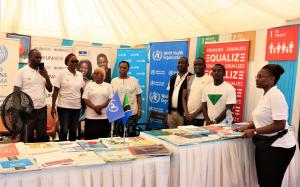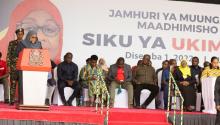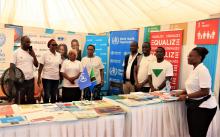Tanzania commemorates World AIDS Day
Lindi Region - The World AIDS Day was commemorated nationally in Tanzania on the 1st of December 2022 with calls to end the HIV epidemic by 2030 by equalizing access to HIV prevention and treatment services and increasing domestic funding for the HIV and AIDS response.
Graced by the President of Tanzania, Honourable Dr. Samia Suluhu Hassan, the climax of the commemoration took place in Lindi town in Southern Tanzania and converged myriad of national and international actors under the theme “EQUALIZE’.
Noting that inequalities hinder efforts to end HIV and AIDS, President Samia appealed for more efforts to address these bottlenecks and be once again on track to end HIV and AIDS by 2030.
WHO participated in the commemorational activities that included a scientific symposium, the inaugural high-level meeting of international and national HIV stakeholders, youth events and exhibitions.
The weeklong activities highlighted that the HIV epidemic disproportionately affected children, adolescents, young girls and, key and vulnerable populations because of prevailing stigma, discrimination, policies and practices that limit their access to HIV prevention and treatment services.
“In addressing the inequalities, local effort is required more than assistance from international organizations to ensure long term sustainability of the HIV response,” said President Samia. She also acknowledged the technical and financial support of international actors in Tanzania’s achievement in the fight against HIV and AIDS.
The United Nation’s Resident Coordinator in Tanzania, Mr. Zlatan Milisic praised Tanzania’s efforts towards achieving 95-95-95 targets that aim at attaining HIV epidemic control and commended the Government’s commitment to adopt scientifically proven best practices to ensure that people living with HIV have access to life saving drugs.
“With emerging new priorities such as the COVID-19 pandemic for major funders of the global HIV response, it is critical that domestic investment in HIV response is increased for sustainability of the remarkable gains and scale up of interventions to attain the sustainable development goals of ending HIV and AIDS as public health threat by 2030,” said Mr. Zlatan.
The United States Ambassador to Tanzania, Dr. Donald Wright commended Tanzania’s achievement in increased access to life saving anti-retroviral medicines from only 1,000 clients 20 years ago to more than 1.5 million PLHIV on ART today. Emphasizing the requirement to address inequalities he observed that people-centered differentiated service models can be useful to address inequalities.
He also reiterated the need for sustainable domestic funding for the HIV response. He applauded the Government’s commitment for establishing a sustainability technical working group that will review establishment of sustainable HIV programmes from domestic finances, sustainable human resources and disease surveillance system.
“Sustainability is not measured in shillings or dollars but more in political leadership,” said Ambassador Wright.
During the event President Samia launched Tanzania’s fifth Multisectoral National Strategic Framework for HIV and AIDS. Under the framework, Tanzania seeks zero new infection, zero discrimination, and zero AIDS-related death by 2026. The global target is to achieve the three zeros by 2030.
The goals come on backdrop of many inequalities in the HIV and AIDS response with the rate of new infections in youth aged 15-24 being higher than in adults and within that group, girls being two to three times more at risk than boys. Access to HIV prevention and treatment services is lower for children, youth, women, and key populations, including sex workers, people who use drugs and men who have sex with men.
The UNAIDS Executive Director, Ms. Winnie Byanyima highlighted the findings reported in the UNAIDS World AIDS report of 2022 that was launched in Dar es Salaam, Tanzania on 30 November.
According to the report 88 percent of adults who live with HIV in Tanzania are on ART, but only 60 percent of children living with HIV are on ART, which reflects the global picture that three quarters of adults living with HIV are on treatment and only half of the children are on ARVs.
“We should not allow this shameful and avoidable injustice to continue. That is why the United Nations, international partners, civil society and governments from the 12 countries with the highest burden have come together and formed the Global Alliance to end AIDS in Children,” said Ms. Byanyima. She commended Tanzania for joining the initiative.
The President, Honourable Dr. Samia directed all Government entities involved in the fight against HIV and AIDS to uphold equality. Specifically, the President stressed on implementing strategies to prevent new HIV infections, improved access to ARVs, addressing stigma and discrimination for vulnerable at-risk populations and innovative sustainable domestic financing.
Communications and Media Officer
WHO Country Office, United Republic of Tanzania
Tel:+255 22 2111718/2113005
Mobile:+255 743 958599
Email: mwijarubim [at] who.int
Medical Officer, HIV and AIDS Treatment and Care
Mobile: +255 763 812 308
Email: musanhuc [at] who.int


